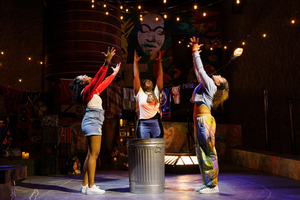Review: BEASTGIRL Holds Audiences Spellbound at the Kennedy Center's Studio K
BWW Review: BEASTGIRL Enchants at the Kennedy Center

Beastgirl, a captivating new musical centered around three first-generation Dominican-American sisters as they examine the historical and mythological roots that underline their lives, begins its world premiere at the Kennedy Center's Studio K this month. The story, written by C. Quintana, is based on a chapbook of folkloric poems titled Beastgirl and Other Origin Myths by New York Times bestselling author Elizabeth Acevedo. Directed by Rebecca Aparicio and featuring music by Janelle Lawrence, Acevedo's poems truly come alive in Beastgirl's funny and moving tale of sisterhood, ancestry, and the myths we claim for ourselves.
The story takes place on the rooftop of the Amsterdam Avenue apartment complex in New York City, where three sisters-Cami (Jenni Gil), Eji (Edima Essien), and Heketi (Mikaela Secada)-meet in the middle of the night to perform a ritual to summon their ancestors. Cami, the oldest, directs her sisters as they light candles, set offerings on an altar, sprinkle salt around the rooftop's edges, and declare their names for the ancestors to hear. The sisters then turn to the audience and ask everyone in attendance to declare their names too.
Yes, this is a show where audience participation is often expected, but please don't let that scare you off. In Beastgirl, the audience is a part of the action. Studio K has been arranged so that a half-moon of risers surrounds the front of the stage. The stage itself has been skilfully designed by Misha Kachman to look like an apartment rooftop a few hours after Dominican Day festivities have wound down, and flyers inviting apartment residents to meet up on the rooftop at midnight are scattered throughout the risers. We are here not just as audience members, witnessing the magic on stage, but as community members, readily participants in the sisters' search for their ancestors.

"We have forgotten all our sacred monsters," Cami states, initiating the sisters' first incantation (the first poem in Acevedo's collection), the story of La Ciguapa, a figure of Dominican folklore who the sisters name the original beastgirl. This is the audience's first taste of how wonderfully Beastgirl's creative team brings Acevado's poems to life. Accompanied by music playing from a simple setup of a laptop and controller, Cami recounts the many myths surrounding La Ciguapa. She chants and sings the lines of Acevedo's poem and Heketi and Eji's voices chime in the background to accent certain phrases. Together, the sisters dance, stomp, and clap in time with the incantation's rhythm.
The first poem/incantation ends, and the sisters wait for their ancestors to appear. When none does, they are thrown into self-doubt, questioning why they haven't ever had success with the ritual, and if it's worth continuing to try. They wonder aloud if their ritual won't work because they aren't in the Dominican Republic; if the physical distance from their roots also severs any spiritual closeness they may have with their ancestors. But Cami, Eji, and Heketi are determined.
As playwright C. Quintana says in the press release, "This musical does not shy away from what's difficult; the sisters hit challenging topics head on to create space for joy and healing." As they continue with the ritual, they search through the ancestry that makes them who they are and that guides them to who they want to become-a lineage of beastgirls like them who have had to "walk the world as 'beastly' beings."
On this rooftop, they offer up their own traumas and those that have been passed down through generations, from the women of the Yoruba tribe to the final cacique of the Taíno people to their own mother. Each new step in the ritual brings them nearer to the ancestors they invoke, strengthening not only the spell but the girls' confidence in themselves and the futures they want to create.
The girls consider the impacts of enslavement, colonialism, immigration, sexism, racism, colorism, and much more. As Cami says later in the show, they want to understand why life seems so much harder on people like them-Afro-Latinos, Dominican-Americans, beastgirls-and how they can carry their heritage with them as they go forth in this world. "Mami enséñame, teach me all of your ways," they sing at one point. "Like how the past calls for me; Mami teach me."
Lines from Acevedo's poems provide the script for the sisters' ritual. As performed by Gil, Essien, and Secada, Acevedo's poems become summoning spells, schoolyard chants, proclamations, prayers, and confessions. Beastgirl gives such reverent and inspired life to these poems and, in turn, the poems provide an incredible depth and profoundness to the script.
By the final invocation, a powerful and emotional call out to Anacaona, the final Taíno cacique, it feels like you've accessed something sacred and loving alongside the three sisters. When Brittani McNeill appears singing as Egun on stage, it's hard to not let your emotions get the best of you--both the cast and audience members were wiping away tears by the end of Saturday night's performance. Beastgirl is a magical show. Don't miss your chance to see it.
Beastgirl appears at the Kennedy Center's Studio K in the REACH until April 22, 2022. Get your tickets here. The run time is approximately one hour.
Photo Credit: Yassine El Mansouri/Elman Studios
Reader Reviews
Videos

